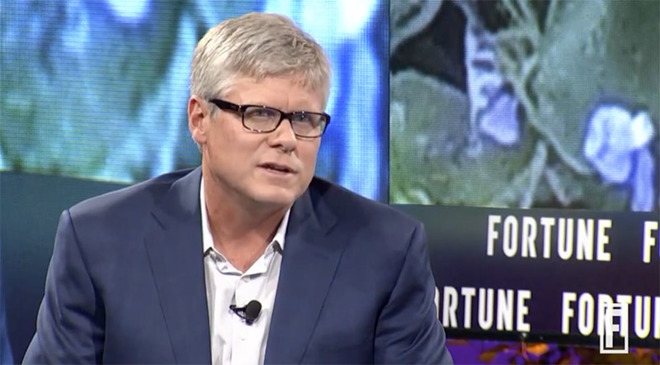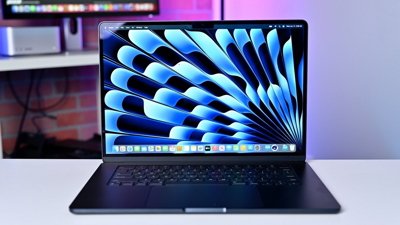Qualcomm CEO Steve Mollenkopf took the stand to defend his company at a trial with the Federal Communication Commission on Friday, saying the chipmaker pushed for exclusivity on iPhone because Apple demanded a $1 billion "incentive payment" to secure the deal.
According to Mollenknopf, Apple said the payment would be used to cover technical costs to transition from communications hardware made by Infineon to comparable components manufactured by Qualcomm, reports Reuters.
Qualcomm agreed to Apple's request, at least in part, as the firm rendered an undisclosed sum to Apple in the form of a rebate starting in 2011. As described by Mollenkopf, Apple received the rebate on chips and licensing as long as Qualcomm remained the sole supplier of iPhone modems.
The deal, which was renewed in 2013, put Qualcomm in a precarious position as it did not specify the number of chips Apple would be obligated to buy. Qualcomm sought an exclusivity arrangement to offset the inherent financial risk, Mollenkopf testified.
"The risk was, what would the volume be? Would we get everything we wanted, given that we paid so much in incentive?" Mollenkopf said on the stand.
The testimony adds a wrinkle to the FTC case, which alleges Qualcomm participates in anticompetitive business practices to the detriment of industry competitors like Intel. Both Apple and Intel assisted antitrust regulators in bringing the case against Qualcomm to court, saying the chipmaker abuses FRAND (fair, reasonable and non-discriminatory) patent licensing commitments to maintain a stranglehold on the market.
Mollenkopf's statements contrast testimony offered by Apple supply chain executive Tony Blevins earlier in the day.
Apple typically attempts to diversify its supply chain by securing at least two manufacturers for each iPhone component, Blevins said, adding that Qualcomm's rebate made it "very unattractive" to seek a secondary chip supplier.
"We think competition and market forces are very important to us to achieve the best leverage," Blevins said, according to CNET. "With exclusivity, there would be no competition."
Apple is involved in its own legal struggle with Qualcomm over licensing, patents and alleged nefarious business practices. Apple fired first with a $1 billion suit in January 2017, claiming the chipmaker abused its "monopoly power" of the wireless modem industry to demand excessive royalties. Qualcomm has since filed multiple countersuits claiming Apple is in breach of contract.
Most recently, Qualcomm won two key rulings in China and Germany, where courts issued a sales ban on certain iPhone models for infringing on Qualcomm patents. Apple is appealing both cases, though Qualcomm this month posted a $1.52 billion bond in Germany to take all iPhones save for iPhone XS and XR off store shelves.
 Mikey Campbell
Mikey Campbell







-m.jpg)






 Amber Neely
Amber Neely
 Malcolm Owen
Malcolm Owen
 Christine McKee
Christine McKee

 Chip Loder
Chip Loder
 Marko Zivkovic
Marko Zivkovic
 Wesley Hilliard
Wesley Hilliard










73 Comments
Hmm...I am not sure why AI is presenting this (the incentive payment) as some kind of a bribe that Apple offered Qualcomm. Going by Florian Mueller's article on fosspatents.com, it appears to be the other way around!
That is, Qualcomm had a habit of negotiating incentive payments (by offering rebates) with device makers in return for strategic favours. So, there's really no wrinkle in the FTC case, as suggested by AI. On the contrary, it aligns with the testimony of Apple supply chain executive Tony Blevins who said the rebate offered by Qualcomm made it very unattractive (read, financially unviable) for Apple to pursue a secondary chip supplier.
In fact, the issue of such 'incentive payments' is one of four issues related to Qualcomm's conduct that are being investigated in the FTC trial. To quote:
********
For the FTC, Jennifer Milici outlined the four key issues surrounding Qualcomm's conduct that the FTC is tackling (let's not forget that some other aspects are at issue in Apple v. Qualcomm in San Diego, where a trial will start on April 15), which are interrelated as she also explained:
********
http://www.fosspatents.com/2019/01/in-its-courtroom-chess-match-with.html
I don't ever want a Dual Sourced iPhone Modem again. As much as like to use Qualcomm iPhone. I think it is time for Apple to just bite the bullet and just make their own Modem. There are quite a few 4G / 5G Modem IP out there already, so it is not like they are starting from Scratch.
But looking at some of the testimony today it doesn't seems Apple ever consider that an option. And if they haven't started now it means we won't be seeing it in the next 3 - 4 years.
Apple screws suppliers, all big companies do it to some extent, some are just more aggressive than other. Supermarkets push milk farmers to the point they can hardly make any money. Apple killed GT advanced technologies because it couldn't meet apples demands, screwed some other imaging company to although forgot the name.
Apple is a super aggressive greedy bully, will do whatever it takes to keep generating its billions. Remember they were going super nuclear on android, well that worked out well for them, they lost that war. Apple now trying to screw over Qualcomm, because all they are thinking about is their share price and retaining their ridiculous profit margins.
On the surface it seems like this dispute could be resolved by reviewing the terms and conditions of the contract between Apple and Qualcomm. Words like "pushed for" and "sought" are troublesome for me because they only imply intent. The same thing applies to Qualcomm's concerns about whether their incentive payments would ever get recouped through orders. Same deal with whether Qualcomm's incentives would serve as a deterrent from Apple seeking other suppliers. Those are all high level business decision points that needed to be made prior to entering into the contract. The only thing that matters is what's baked into the contract. I cannot imagine big players like Apple and Qualcomm, each with their own army of lawyers, to leave big deals like this open to interpretation. To me this sounds like Qualcomm stepped in a stinky pile all on their own, suddenly realized their mistake, and tried to put the screws to Apple after the fact to cover up their self-inflicted mistakes. There's a reason why big companies have big teams of lawyers reviewing big contracts.